
Hot Water Heater Buyer's Guide For The Home
Last Updated: Mar 29, 2025Hot water is part of our everyday lives, whether for showering, dishwashing or clothes washing. What most of us do not realize, however, is that the energy used to heat water is often the most energy-intensive aspect of most appliances and water fixtures in the home. In washing machines, heating water accounts for around 90 percent of the energy used during a washing cycle. The same goes for dishwashers. To wash our clothes and dishes, simply choosing cold water cycles or settings is a quick and easy way to drastically reduce our household energy use. However, when it comes to showering or bathing, the thought of jumping in freezing water early in the morning is not exactly comforting.
So how exactly can homeowners cut back on their household energy usage (and monthly energy bills) while still enjoying the comfort of warm showers and faucets?
Many homeowners assume that the traditional, tank-style water heaters are the only option available to them. Today, however, homeowners can choose from a wide range of different types of water heaters. Tankless water heaters can be powered by gas or electric power, and heat pump water heaters continue to gain popularity as more and more homeowners adopt heat pumps for efficient home heating and cooling. These water heater options come with benefits and drawbacks in energy efficiency, cost, and space requirements.
Water heating is the second-largest energy end-use in homes after home heating and cooling. It accounts for 17 percent of residential energy consumption and generally costs homeowners anywhere from $200 to $600 a year. According to the ENERGY STAR Program, around 8 percent of US households replace their water heaters each year. If you are in the market for a new water heater, upgrading from a traditional heater to a more energy-efficient option can pay for itself within a couple of years. This guide will take a quick look at some of the most widely available water heater options. Then we'll explain how an energy-efficient water heater can save homeowners in the long run.
Table of Contents
- How Is Water Heater Efficiency Measured?
- The Types of Water Heaters Available
- How Efficient Is a Water Heater?
- What Is a Tankless Water Heater?
- What Is a Heat Pump Water Heater?
- What Is a Solar Water Heater?
- Water Heater Cost Comparison
- Notes about Hot Water Consumption

How Is Water Heater Efficiency Measured?
A water heater's efficiency is described by its Energy Factor (EF). EF refers to the amount of hot water produced for the amount of energy consumed, whether it be electricity, natural gas, or oil. The higher the energy factor, the more energy-efficient the water heater is. In general, electric resistance water heaters will have an energy factor that ranges from 0.7 to 0.95. Gas water heaters have EFs in the range of 0.5 and 0.6, though recent high-efficiency models have achieved an EF of 0.8. Oil-water heaters have EFs between 0.7 and 0.85. It is worth noting that homeowners looking to achieve net-zero energy will want to opt for electric water heaters or solar water heaters. These options eliminate dependence on fossil fuel sources of energy. Also, because on-demand (or tankless) water heaters do not have standby or cycling energy losses from the tank, they almost always have better EF ratings than tank-style heaters. Sometimes it can be hard to find the energy factors for different water heaters. If this is the case, the ENERGY STAR criteria for water heaters is an excellent place to start.

Note:
- Only Heat Pump Electric Storage Water Heaters qualify!
- Electric or oil-fired tankless water heaters are not ENERGY STAR Certified.
The ENERGY STAR requirements for electric water heaters are much stricter than for gas-fired water heaters. Going electric can help save energy and reduce greenhouse gas emissions, especially if your electricity comes from a renewable resource like solar, wind, or hydro. For this reason, we here at Rise encourage homeowners to move toward an all-electric home. Check out this Rise article for more information on the advantages of an all-electric home.
The Types of Water Heaters Available
While a water heater's EF is an excellent way to compare the different available options, it doesn't always tell the story. Below, we describe the benefits and drawbacks of different water heater types.

How Efficient Is a Water Heater?
Storage tank water heaters are easily the most common water heaters powered by electricity, gas, or oil. According to an ENERGY STAR market report, in 2009, storage tank waters accounted for 97 percent of the market. Though this number has most likely been dropping as homeowners begin to search for ways to increase their homes' energy efficiency, storage-style heaters continue to be the most common option for homes.
Older or less expensive models are less insulated and can consume a lot of energy. Even when hot water is not being used, the water heater must keep the water inside the tank hot. If you have one of these models, consider getting an insulation blanket for it. Also, investing in a water heater timer is another way to reduce energy consumption, especially if you spend extended periods away from your home when hot water is not needed.

What Is a Tankless Water Heater?
Tankless or on-demand water heaters are becoming attractive for homes that lack the necessary space for more extensive storage tanks. They are usually wall-mounted, taking up no more than 2' x 2' of wall space, and are still powerful enough to supply water to your entire home. These water heaters range in output from 10 to 30 kilowatts. The size can make a big difference in the amount of hot water they can produce at once. It is essential to get a sized model appropriate for the number of people in your home.
Tankless water heaters also come in a smaller version, as point-of-use models that serve a single sink or a shower. These are small enough to fit in a cabinet under the sink or in the shower. While these are uncommon in North America, they are popular in many other parts of the world, such as Europe and South America.
Another benefit of point-of-use tankless water heaters is that they allow you to only direct hot water to the areas where hot water is necessary, such as showers or sinks. Because most laundry detergents can wash clothes perfectly well in cold water, this option allows homeowners to avoid running a hot water line to their laundry room.
Homeowners can expect to save around $165 per year by updating to either a gas or electric tankless water heater, and it should last for approximately 20 years. For more information on these super-efficient water heating options, check out our Rise tankless water heating guide, and for more guidance on how to calculate your payback period, check out our Tankless Water Heater Calculation Guide.

What Is a Heat Pump Water Heater?
Heat pump water heaters operate on the same principle as your refrigerator, though in reverse. They extract heat from the air using a refrigerant and transfer the heat into the water. In doing so, they also cool your home, which is helpful in summer but adds to your heating bill in winter. They also dehumidify a space and can be beneficial if located in a humid area such as a basement. Heat pump water heaters store the excess heat that they extract from your home in the form of hot water to be used for your household needs.
For even more energy savings, consider combining a heat pump water heater with an air-to-air heat pump. This type of system can efficiently heat and cool your home while simultaneously providing hot water for your showers, sinks, and other water connections. Because residential rooftop solar panels can power heat pumps, homeowners can access an entirely net-zero heating, cooling, and hot water source.
Though heat pump water heaters might cost a bit more upfront, the ENERGY STAR program estimates that switching from a traditional electric water heater to a heat pump water heater could save up to $330 per year for a four-person household. This amounts to a two-year payback period and total savings of almost $3,500 over the unit's lifetime. Check out this complete Rise guide for more information on heat pump water heaters.

What Is a Solar Water Heater?
Solar water heaters (also called solar thermal) use the sunlight to heat your hot water. Solar panels are installed on your roof. An antifreeze solution, usually propylene glycol, is circulated through them and into your house. A heat exchanger then transfers the solar heat to your hot water supply. You will need a water heater with gas/oil or electric backup in colder climates to ensure you get hot enough water on days where there isn't enough sun. This system, however, is completely "energy-free," making it an excellent option for households located in warm climates.
Water Heater Cost Comparison
Here is a comparison of the operating cost of different kinds of water heaters. This example is for a household that consumes approximately 200 L/day (similar to a 3-person home). Of course, the actual costs and savings will vary depending on how much hot water your household consumes.
Water Heaters
Shop water heater products that have been vetted for your health, wealth, and the planet.
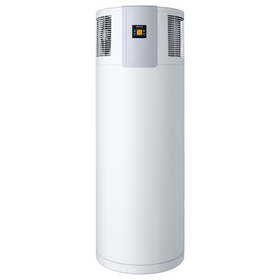
Stiebel Eltron Accelera 300 E Heat Pump Water Heater
Stiebel Eltron
In Stock
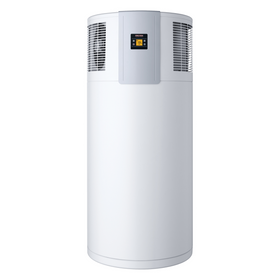
Stiebel Eltron Accelera 220 E Heat Pump Water Heater
Stiebel Eltron
In Stock
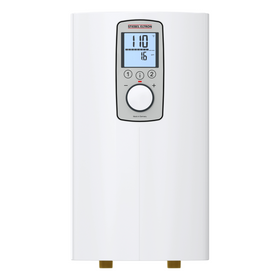
Stiebel Eltron DHC-E 8/10-2 Plus Point-of-Use Electric Tankless Water Heater - 202145
Stiebel Eltron
In Stock
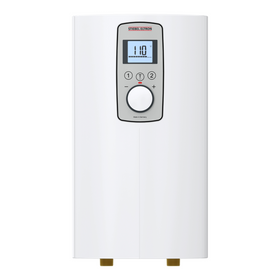
Stiebel Eltron DHC-E 3/3.5-1 Trend Point-of-Use Electric Tankless Water Heater - 200057
Stiebel Eltron
In Stock
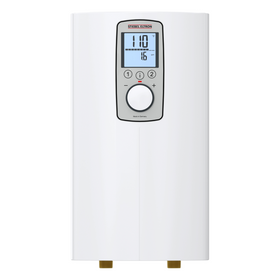
Stiebel Eltron DHC-E 12/15-2 Plus Point-of-Use Electric Tankless Water Heater - 200056
Stiebel Eltron
In Stock
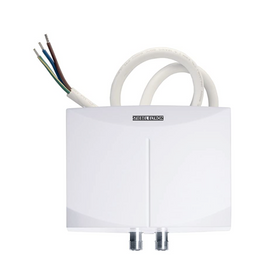
Stiebel Eltron Mini 2-1 Single Handwashing Sink Electric Tankless Water Heater
Stiebel Eltron
In Stock
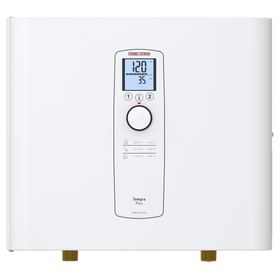
Stiebel Eltron Tempra 24 Whole House 24 kW 5 GPM Electric Tankless Water Heater
Stiebel Eltron
In Stock
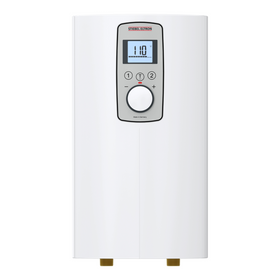
Stiebel Eltron DHC-E 8/10 - 2 Trend Point-of-Use Electric Tankless Water Heater - 200058
Stiebel Eltron
In Stock
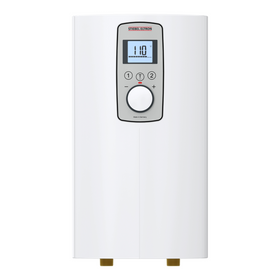
Stiebel Eltron DHC-E 4/6.2 - 2 Trend Point-of-Use Electric Tankless Water Heater - 200061
Stiebel Eltron
In Stock
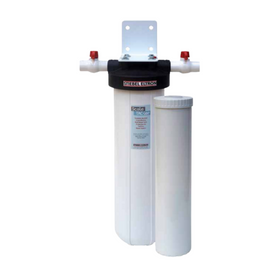
Stiebel Eltron Scale TAC-ler Cartridge
Stiebel Eltron
In Stock

Notes:
- The Solar Energy Factor (SEF) is estimated to be two based on typical systems' performance in Nova Scotia, Canada. A solar water heater's performance depends on many other factors, such as the panels' location (i.e., Nova Scotia vs. California), the panels' orientation and shading, and consumption.
- Tankless water heater installed cost sourced from Fixr.
- Heat pump water heater payback range sourced from ENERGY STAR.
- Individual solar system components may need to be replaced over time, like the pump or the backup heater.

Notes about Hot Water Consumption
When deciding what kind of water heater to get, how much hot water your household uses is a significant factor in the decision.
High Consumer Water Consumption
While a tankless water heater avoids standby heat loss, it supplies an endless amount of hot water, unlike a storage tank water heater with a limited supply. The tankless heater can allow you to take longer showers. But if you do this, you will consume more energy and run the risk of eliminating any savings you gained from installing it. In homes where multiple people shower every morning, sharing the water from a limited storage tank can encourage people to take shorter showers. As is often the case, homeowner behaviors and habits are often the most critical element in improving your home's operational efficiency.
Low Consumer Water Consumption
If you don't use hot water often or are away from home for extended periods, a tankless water heater may be a more energy-efficient option. Since no stored water will be maintained at a high temperature during these periods, a tankless option presents an opportunity to save.
Selecting a water heater requires choosing a balance between affordability, space, and energy efficiency. Going from a storage tank or tankless model to a solar water heater can save a lot of energy. Still, the additional cost can be hard to justify. However, heat pump water heaters are becoming an affordable option that can save as much or more energy than a solar water heater.

To help with affordability, look for rebates for the most energy-efficient water heaters.
If you aren't looking to replace your existing water heater yet, also consider these cheaper options to help reduce energy and water consumption:
- Tank wrap (an extra layer of insulation to reduce standby losses)
- Drain water heat recovery – see this article here about recovering heat from your wastewater.
- Faucet aerator – these little add-ons reduce water consumed from your taps.
- High-efficiency showerheads – consume less water when you shower.
Tobias Roberts
Tobias runs an agroecology farm and a natural building collective in the mountains of El Salvador. He specializes in earthen construction methods and uses permaculture design methods to integrate structures into the sustainability of the landscape.
